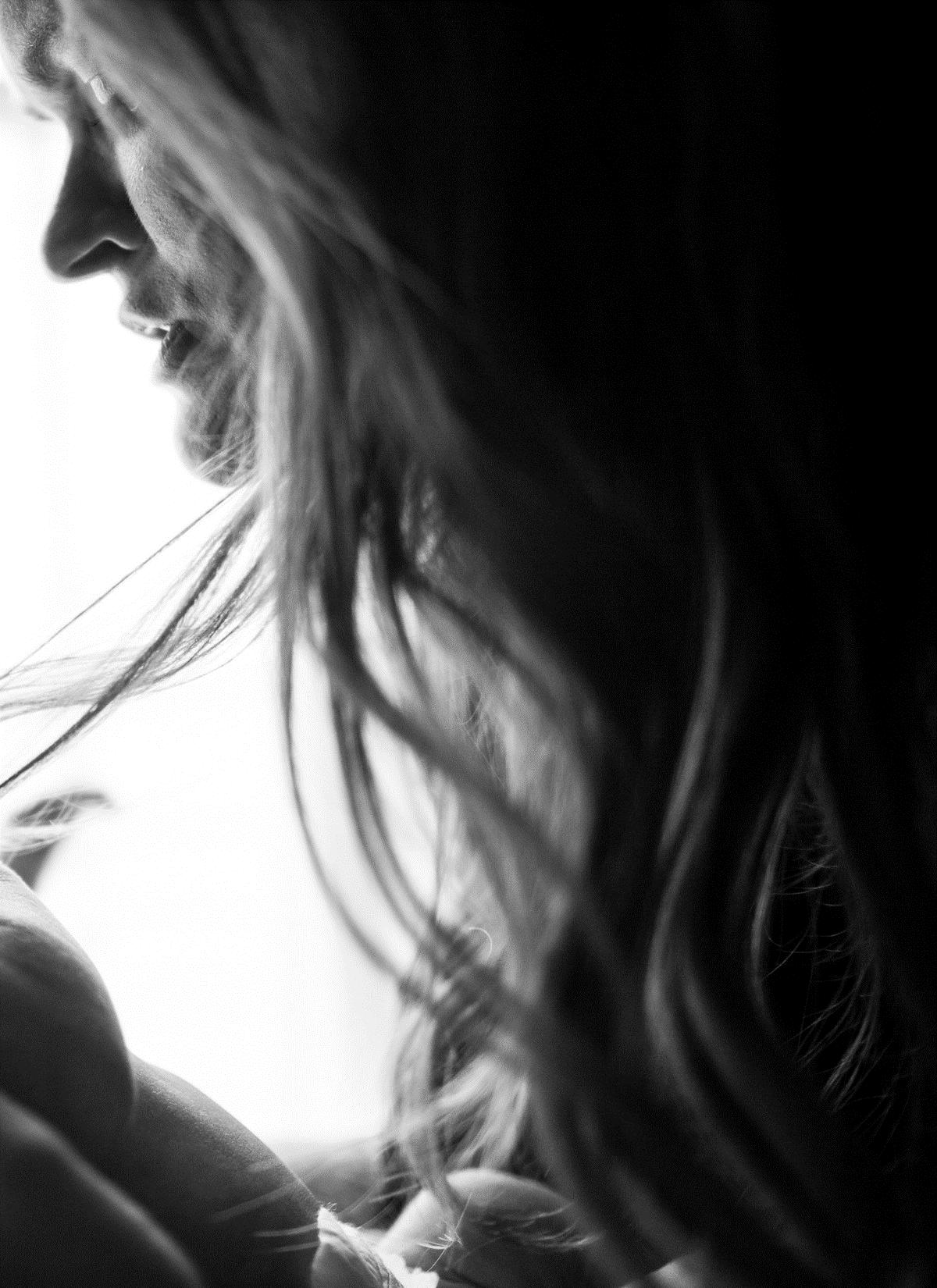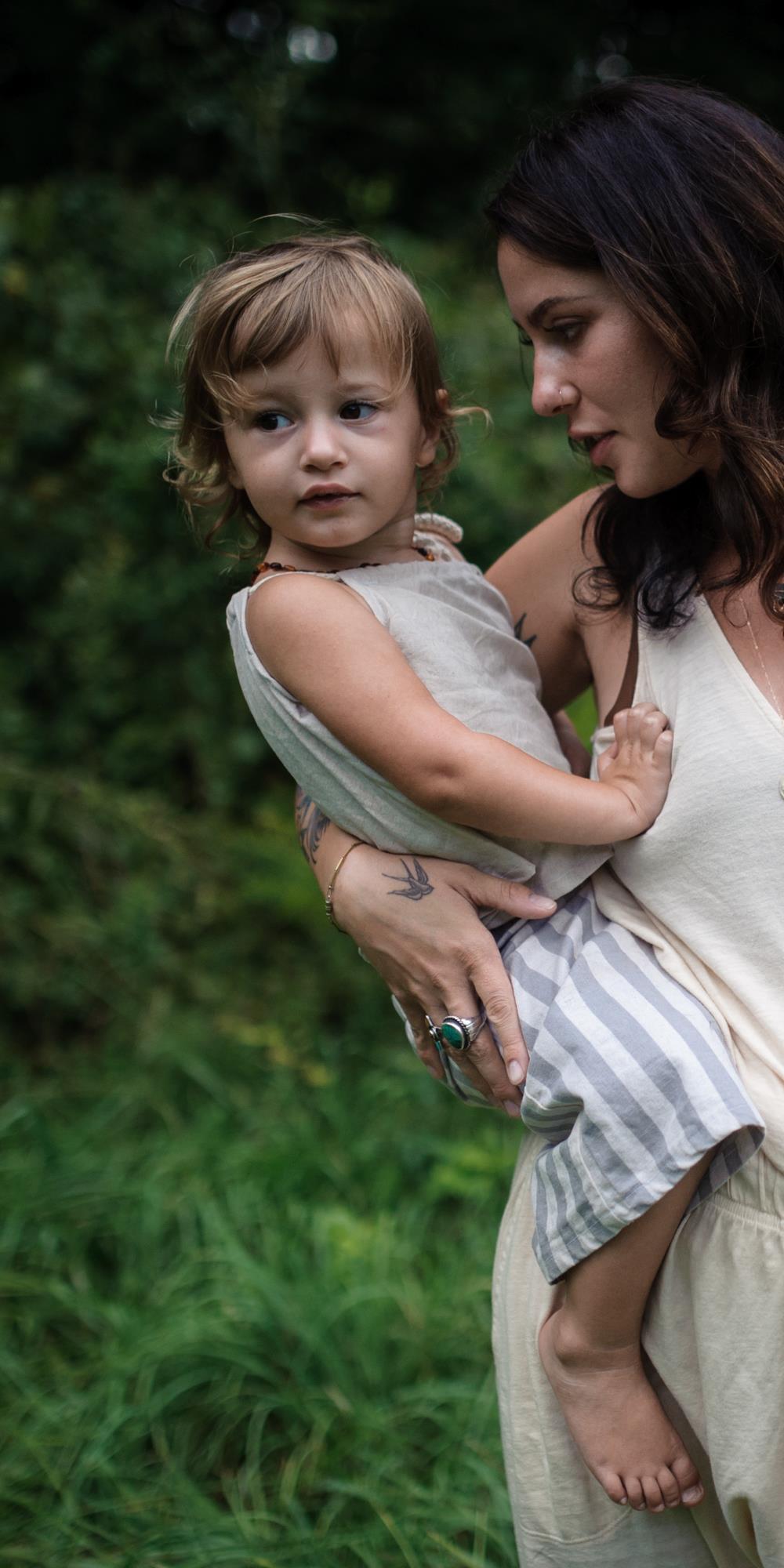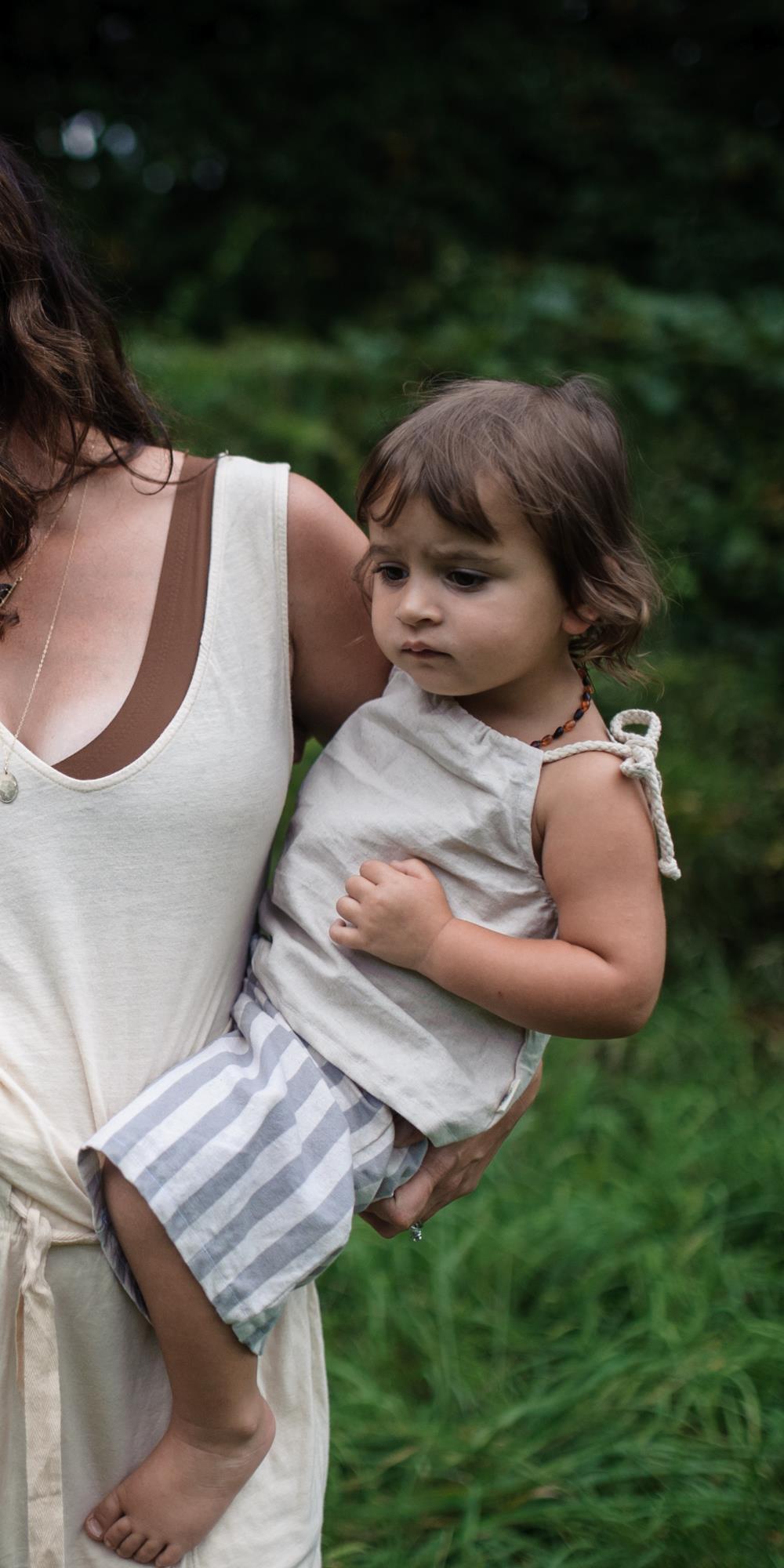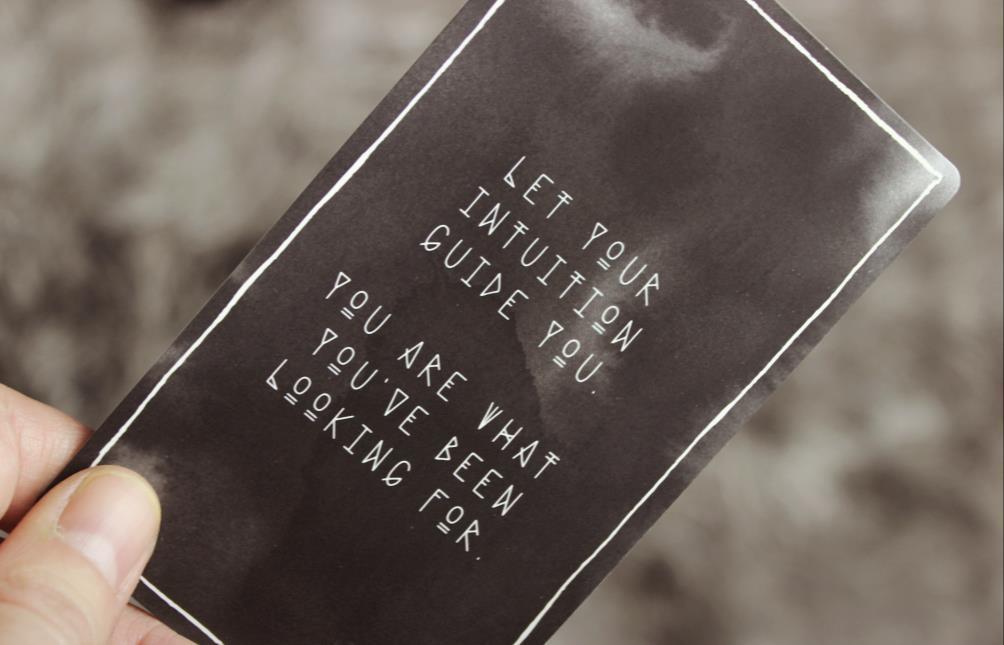
11 minute read
Embracing Mother's Intuition Rediscovering Our Inner Wisdom in the Age of Information

By Joni Stone, CPM, MA
Advertisement

Sitting in the hard plastic chair beside the exam table at the pediatrician's office, Carla sways gently while reflexively smelling the folds of her sleeping baby's neck. Her baby's face is smushed into her shoulder, and the one-month-old’s body lies limp in slumber. Anxiously waiting for the door to open, Carla tries to make sense of the bustling bodies and voices of the nurses and doctors on the other side. Startled, she finally hears the door creak open.
The young doctor greets Carla with a brief smile, but his eyes quickly shift down to the chart in his hands as he glides towards the sink on a round stool. He begins, "Your baby is in the 10th percentile for weight, and you should consider supplementing your breastmilk with formula.“
Overwhelmed by a mix of emotions, Carla's gut wrenches, and her once calm baby now tenses up and cries. As she gently bounces her baby, attempting to soothe both of them, she struggles to make sense of the doctor's words that clash with her inner sense that everything is fine. Her baby has been urinating and having regular bowel movements. A flurry of thoughts fill her mind, a blend of defensiveness and sadness, but amidst it all, she carries a profound sense of inadequacy, feeling that she hasn't met her baby's needs. Carla, with her petite frame, has always been on the lower end of the percentile chart herself. Despite her doubts, the doctor's unwavering conviction makes her assume he must be right, while she questions her own judgment.

Sitting in doubt and conflicting emotions, Carla struggles to find clarity. She longs to trust her own intuition, the gentle whisper within that tells her she's been doing just fine. But the weight of societal expectations and the perceived expertise of the doctor weigh heavily on her.
Carla's journey is not an isolated one. Countless mothers face similar dilemmas, torn between external advice and their own intuitive whispers.

In our fast-paced American culture, productivity and proactivity are highly valued, making us a nation of "doers." However, this mindset poses a unique challenge for mothers. The daily tasks of motherhood and household maintenance often lack tangible, finished products. Consequently, we tend to equate our worthiness with productivity, creating a complex dynamic for mothers to navigate. Amidst this cultural landscape, we find ourselves conditioned not to recognize our intuition, or to altogether disprove its existence.
So, where has our intuition gone?
With an overwhelming influx of information, we have collectively come to believe that decisions must be made logically or through exhaustive thought processes. We rarely find moments of quiet to make decisions; and instead we reflexively seek out more information.
Consider the countless times you have turned to external sources for answers a quick Google search or seeking advice from doctors, friends, or family. How often do these sources provide the exact answer you were looking for? More often than not, they leave us craving even more information. Yet, we must recognize that these external resources cannot fully comprehend our specific circumstances or know our children better than we do. While doctors and health professionals draw on their education and experience, their knowledge may not be directly applicable to our unique situations.
Let's reflect on how we typically approach our parenting concerns. When faced with a health issue concerning our child or seeking to make changes to their sleep patterns or behavior, what is our first instinct? If we're honest, a large majority of the time, we turn to the internet for answers. In 2013 a study by Declercq, Sakala, Corry, Applebaum & Herrlich, showed a staggering 84% of mothers sought parenting advice online, and it's safe to assume that number has dramatically increased with the widespread consumption of social media.
It's time to reclaim our inner wisdom and tap into the wellspring of intuition that resides within us. Rather than solely relying on external sources, let us cultivate moments of silence and introspection. By doing so, we can access the answers we seek with greater clarity and authenticity. Remember, your intuition is a powerful tool that speaks to your unique circumstances and the needs of your child.

In the upcoming sections, we will explore the common barriers that hinder our connection with intuition and discover practical ways to nurture and develop this invaluable resource.
As I will expand upon further, my working definition of intuition is:
“A holistic process that encompasses physical cues, emotional scaffolding and spiritual awareness that transcends pure logic to align with your higher self and resonate in your heart space.”
The Age of Anxiety
Our negative thoughts carry three times more weight than our positive thoughts due to the way our brains are wired for survival. This explains why negative thoughts tend to dominate our thinking and why we easily forget about the positive aspects. External influences like fear-based news and other people's fear-mongering capitalize on this tendency, as they know negative stimuli elicit stronger responses. Although most of us don't live in constant danger, our brains aren't aware of this fact, causing us to fixate on the negative. This pattern of thinking can contribute to anxiety, particularly in motherhood when protecting our children consumes our instinctual brain function.
Individuals who grew up in abusive or resource-limited environments may struggle even more with this mindset. Now, this may sound counterintuitive: All our decisions are emotional rather than logical. While this might sound radical, we make decisions out of comfort, safety and fear; and based on our emotional composition informed by our upbringing, traumas, and transgenerational traumas. Our limbic system, responsible for emotions, plays the primary role in decision-making and lacks access to language. Consequently, decisions are made subconsciously, and our rational brain, the prefrontal cortex, rationalizes these emotional choices. Understanding the emotional foundation of decisionmaking is crucial for unlocking our intuitive abilities. Intuition involves recognizing physical cues, understanding our emotional framework, and acknowledging unseen beliefs.
I encourage you to observe the small decisions you make throughout the day and notice if they stem from fear or safety. Whether it's choosing groceries or selecting a route home, try to identify the associated emotions with each decision.

Intuition skeptics believe it merely involves picking up on subtle cues, disregarding the aspect of intuitive "knowing." While there is truth to that perspective, there's more to the story. Our heart and intestines also house neurons, forming what is known as the cardiac brain and the gut brain, respectively. The cardiac brain, with its 40,000 independent neurons, handles emotional processing, the expression of values, and interpersonal connections. On the other hand, the gut brain, containing a staggering 100 million neurons, governs selfpreservation, response to challenges and danger, and contributes to our core sense of self. So, when someone experiences heartbreak, there can be a physical experience of pain in the chest. Similarly, a “gut reaction”, like Carla's in the aforementioned story, arises from fear triggering signals through the nervous system, prompting a fight or flight response. Living in a busy, fear-driven society has consequences for our nervous systems. It often leads to heightened reactivity to triggers, overshadowing balanced emotional and thoughtful responses. To enhance our intuition, it becomes essential to engage in activities that regulate our nervous systems, activating all our receptors. This allows us to grasp the messages we receive from various sources and integrate them, recognizing how they resonate within ourselves and striving for alignment.

Slowing Down and Tuning In
Your intuition is NOT the loud voice yelling in your ear... it is the small quiet voice with the ever so gentle hand on your shoulder.
Slowing down and tuning in to our inner selves is crucial for our wellbeing. Incorporating the following exercises into your daily life, especially during moments of heightened emotions or triggers, can be immensely beneficial for honing your intuition. These exercises help calm your sympathetic nervous system (responsible for fight or flight responses) and activate your parasympathetic nervous system. Another key component to consider is vagal tone, which refers to the activity of the vagus nerve responsible for regulating parasympathetic actions. Research has shown that strong vagal tone is essential for positive relationships and overall thriving, as it increases autonomic flexibility.
To enhance vagal tone and autonomic flexibility, it is recommended to engage in mindfulness practices and techniques that promote positive emotions and induce oxytocin (the love hormone). These practices foster adaptability, openness to spirituality, and elevate positive emotions and social connectedness.
As a mother, finding time for meditation and mindfulness is often elusive, but even dedicating 5-20 minutes can make a difference. Research suggests that spending 18 minutes a day is the magic amount of time to recalibrate your nervous system.
You can create this time by stepping outside to enjoy a cup of tea while listening to birdsong and observing nature. Going to the beach to immerse yourself in the sound of waves and the sensation of sand between your toes can also be rejuvenating. Alternatively, simply sitting back and appreciating the beautiful chaos within your family can be a moment of mindfulness.
Here are some additional ideas to incorporate into your routine, aiming for 18 minutes a day and one block of 2 hours per week:
▪ Breathwork or breathing exercises
▪ Meditation
▪ Walking in nature
▪ Earthing: walking barefoot on natural surfaces
▪ Yoga
▪ Tai chi
▪ Starting and ending the day by writing in a gratitude journal
▪ Meaningful conversations with a friend
▪ Joining a women's circle or council
▪ Watching a sunrise/sunset
Restful sleep and regular exercise play crucial roles in calming the nervous system. However, recognizing the challenges of achieving these while navigating motherhood, it can be helpful to start with the aforementioned mindfulness practices.
If you have experienced a traumatic childhood or are currently dealing with trauma, I highly encourage you to seek the support of a therapist or coach who can help you navigate and heal from those experiences. They can provide invaluable guidance and support on your journey.
A Quick Breathwork Exercise:
Conscious control of our breath serves as a powerful tool in creating a sense of safety within ourselves. It sends soothing signals to our nervous system, prompting our heart rate to slow down and signaling that there is no imminent need for fight or flight response. Through this practice, we communicate a message of wellbeing to our vagus nerve, fostering mental well-being and creating space for heightened senses and intuition. This exercise is particularly effective when we find ourselves in a heightened state, offering a tactical approach to calmness.
I invite you to dedicate just 3 minutes to this breathwork exercise. Here's how you can proceed:
Set a timer to ensure you allocate this short but valuable time for yourself.
Begin by inhaling deeply, counting to 4 as you fill your lungs with air. Hold your breath for a count of 5, allowing the oxygen to nourish your body and mind.
Release your breath slowly and steadily, counting to 7 as you exhale. Allow any tension or negativity to leave your body with each breath.
Once you establish a comfortable rhythm with this breathing pattern, you can take it a step further. During the inhalation, envision yourself breathing in what you wish to receive or the feelings you desire to experience. As you release the breath, imagine exhaling anything that no longer serves you, letting go of any negativity or stress.
For extra credit- consider journaling about how you feel after completing this breathwork exercise. Reflect on the sensations, emotions, or shifts you experienced. Additionally, write down something you are grateful for.
Expression of Spirituality & Art
“Intuition is a spiritual faculty and does not explain, but simply points the way.”
-Florence Scovel Shinn
While on the surface, spirituality and art may not appear directly linked, they converge within our brains and through our belief in the unseen. Believing in a higher power or a collective consciousness opens the door to intuition, reinforcing one's faith and confidence in its existence. Researchers at Harvard have delved into the correlation between spirituality and intuition, discovering a deep and significant connection. In this way, the realms of spirituality and art intertwine, allowing artists to tap into a perceptive connection with their intuitive abilities.
Likewise, artists who are skilled in accessing a state of flow, fully engaging their creativity, and bringing something into existence from seemingly nothing, also share a profound connection with intuition. Furthermore, it is important to note that one does not have to be an artist or intensely religious to engage with their intuition. Even through simple practices such as prayer and making time for creativity, like engaging in artwork with your children, one can strengthen their intuition muscle.
These activities allow us to tap into our innate intuitive abilities and develop a deeper connection with our inner wisdom. By embracing moments of creative expression and incorporating spiritual practices into our daily lives, we can cultivate and nurture our intuition, regardless of artistic or religious background.

Embodying Intuition
In our modern society, our bodies have often been subjected to societal conditioning that perceives them as flawed or in constant need of improvement. However, our bodies are the external expression of our internal condition. As we mentioned earlier, we have neurons not only in our brains but also in our hearts and intestines. This means that the sensations and feelings experienced within our bodies can offer profound insights, particularly when our cognitive thoughts might be clouding our intuition.
By attuning ourselves to the wisdom held within our bodies, we can tap into a deeper level of intuitive understanding. Our bodies communicate messages and signals that guide us towards what truly resonates with our authentic selves. Learning to listen to the sensations, tensions, or subtle cues within our bodies can reveal valuable insights.
As individuals, our experiences and perceptions vary, including how we feel and interpret things. Contrary to common belief, I personally believe that intuition is guided by the heart. While we may sense intuitive feelings in our gut, it is the space within our heart that holds the key to that gentle, subtle voice attempting to convey a message.
I invite you to take a moment, close your eyes, and recall a time when you experienced the following emotions. As you reflect on each emotion, pay attention to where you feel the corresponding sensations within your body.
Anger Fear Joy Distrust Love
By consciously exploring where these emotions manifest within your body, you can begin to establish a framework for your personal embodied intuition. This process allows you to deepen your understanding of how your body communicates these emotions. Embracing this awareness can empower you to trust and navigate your own intuitive wisdom more effectively.

Reflection
Reflecting back, Carla's story serves as a reminder that intuition is not something to be dismissed or silenced. It is a valuable compass that guides us on our unique journeys as mothers, helping us navigate the intricate dance of love, care, and decision-making. This article is an invitation to pause your search for answers on your phone and take a moment to truly listen.

Embracing intuition as mothers allows us to tap into our inner wisdom and navigate the complexities of parenting with confidence and authenticity.
In a society driven by information overload and external advice, it is crucial to slow down, tune in, and trust the gentle whispers of our intuition. By cultivating moments of silence, engaging in mindfulness practices, and exploring our spirituality and creativity, we can strengthen our intuitive abilities. Our bodies, with their inherent wisdom, can also serve as guides on this journey. As we honor our intuition and reclaim our inner knowing, we create a nurturing space for ourselves and our children, fostering greater harmony, joy, and confidence in our parenting experiences. Let us remember that intuition is not something to be dismissed or silenced, but a sacred gift.
Joni Stone, CPM, MA
Joni is a midwife, life coach, mother of 3, and healer whose impactful career spans over 25 years, supporting more than 1,300 families. Currently providing group and 1:1 life, health and relationship coaching for women in all seasons of life both locally and virtually, Joni brings a holistic approach to her work. With a master’s degree in psychology from Columbia University’s Spirituality Mind Body Institute and expertise in transformative modalities such as Maya Abdominal Therapy, Holistic Pelvic CareTM, Havening Techniques for trauma, and Family Constellations, Joni possesses a deep understanding of the human psyche and spiritual dimensions that impact health and wellness. Joni’s belief in navigating challenging times with resilience and her dedication to accessing the power within shines through her work, guiding others through their wilderness with compassion and empowerment.










